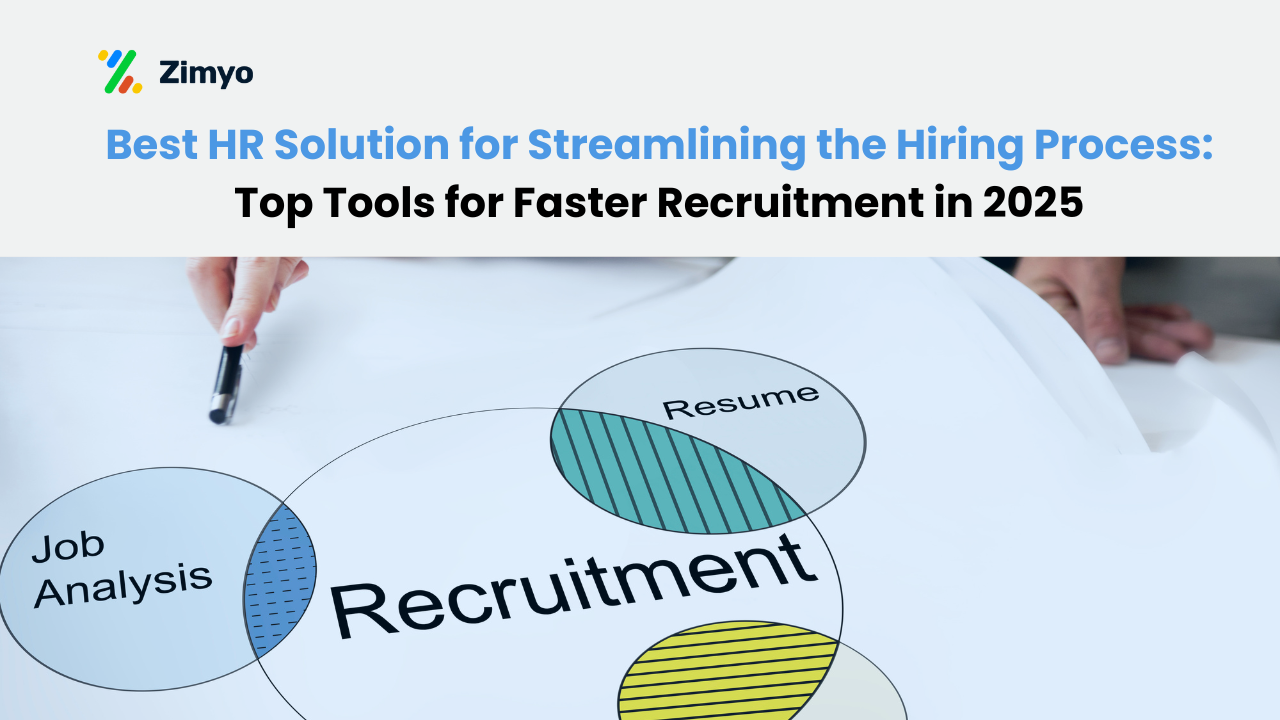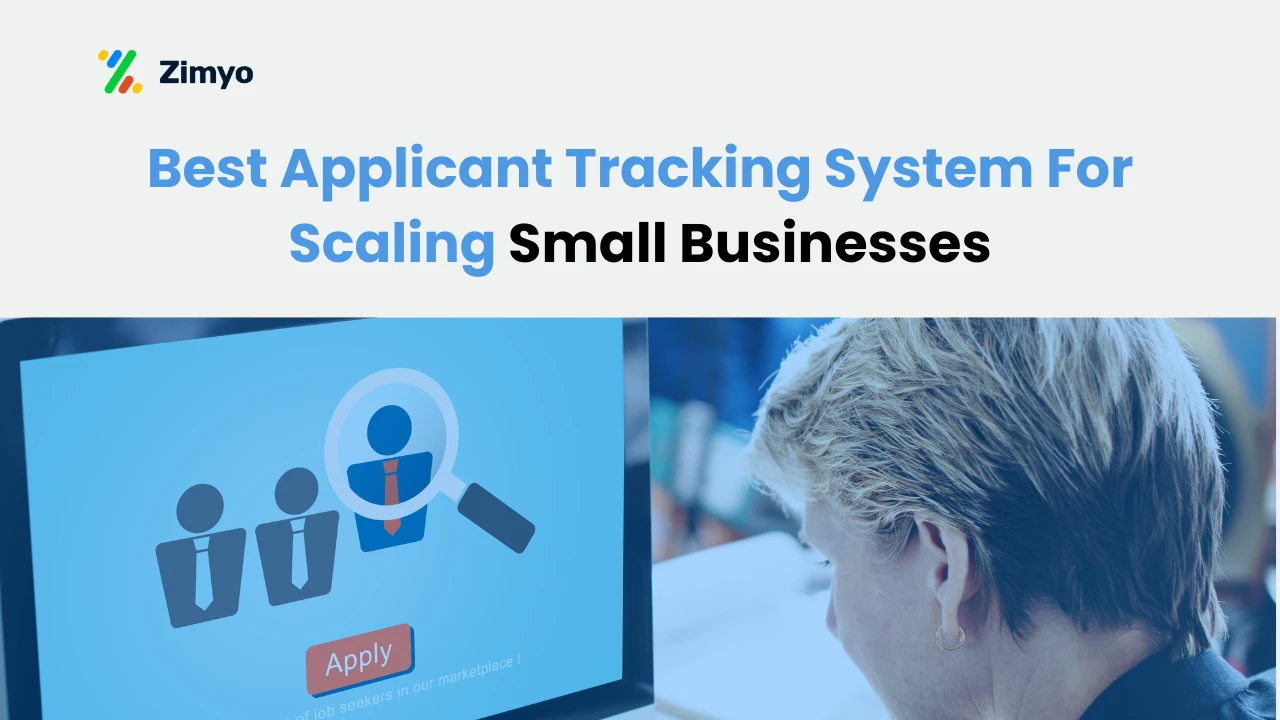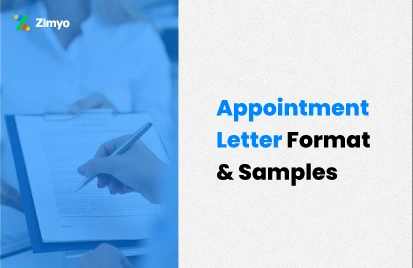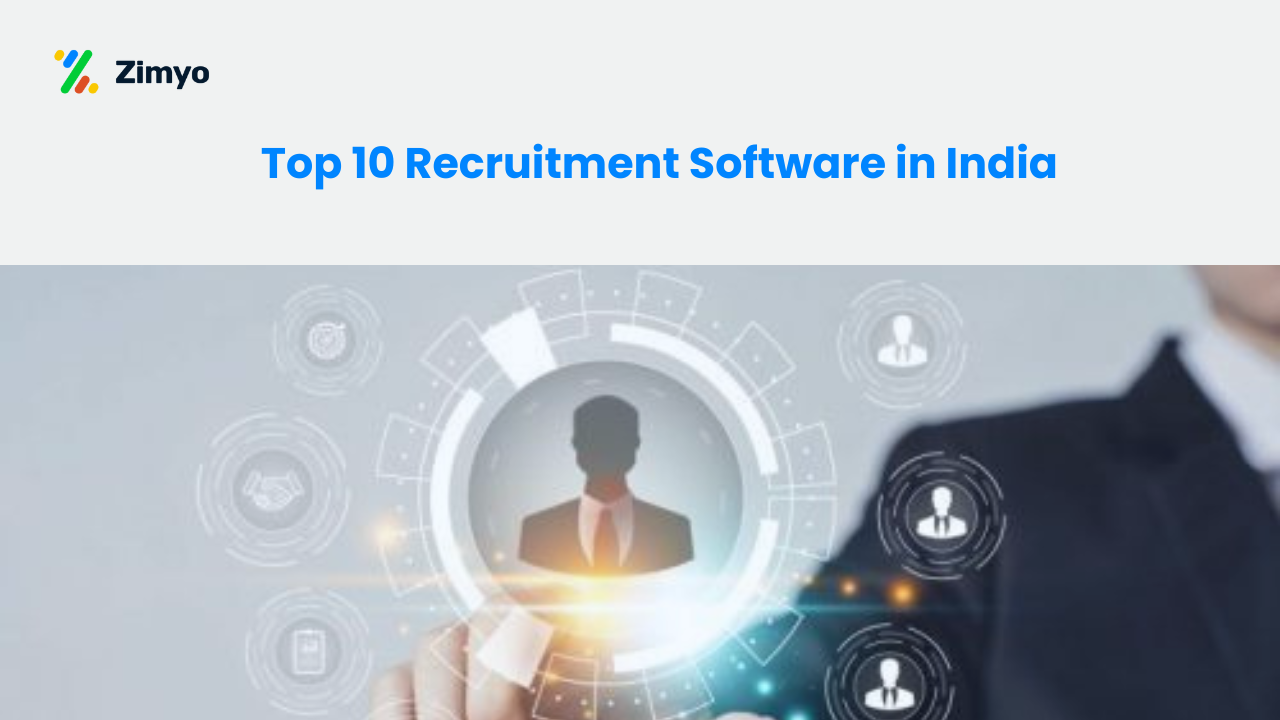Hiring the right talent has never been more competitive. Organizations need powerful recruitment management software to handle everything from job postings to candidate tracking. Traditional hiring methods are slow, repetitive, and full of paperwork. That is why businesses are shifting to modern solutions like recruitment CRM systems, candidate relationship management tools, applicant tracking systems, and end-to-end recruitment management systems.
A good recruitment management software helps companies save time, improve candidate experience, and make hiring more data-driven. Whether you call it a candidate tracking system, a CRM for recruitment, or a candidate relationship management system, the goal remains the same, aligned hiring and better decision-making.
In this blog, we will look at the best recruitment management software in 2026. We will compare features, explain the pros and cons of each tool, and help you choose the right recruitment management system for your business.
List of the Best Recruitment Management Software
Here is the list of the List of the Best Recruitment Management Software:
- Zimyo
- Zoho Recruit
- Workable
- Gusto
- Recruit CRM
- BambooHR
- GoHire
- SmartRecruiters
- Rippling
Now, let us understand each of these in detail.
Best Recruitment Management Software: Explained in Detail
Below is a detailed review of each recruitment management system. You will find a brief history, unique features, and a simple pros and cons comparison table for every software.
1. Zimyo
Zimyo is one of the fastest-growing HR and recruitment technology providers in India and abroad. Designed for organizations of all sizes, Zimyo recruitment management software is trusted by startups, SMEs, and enterprises. It combines a candidate relationship management system, a powerful applicant tracking system, and a complete recruitment CRM system in one platform.
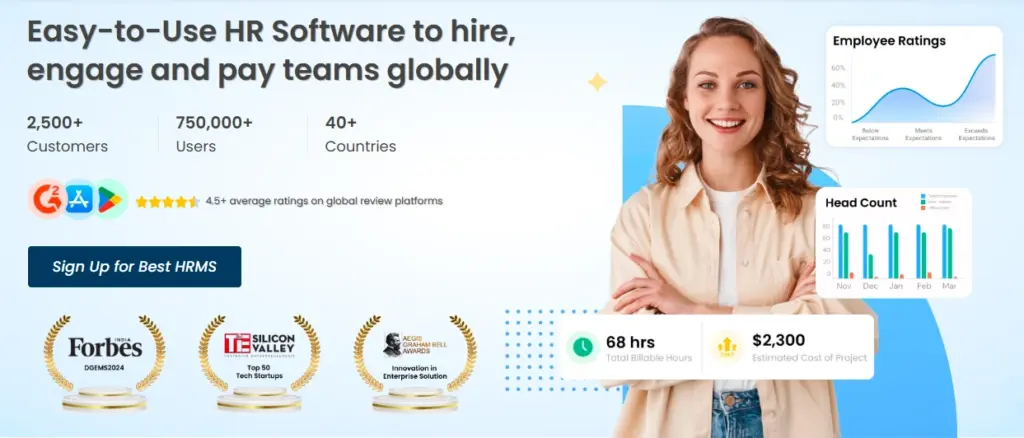

Unique Features
- Direct integration with job boards like LinkedIn, Naukri.com, and Google Jobs
- Smart candidate tracking system with resume parsing and bulk actions
- Automated email workflows for better candidate relationship management
- Custom offer letter creation and digital approvals
- Interview scheduling with calendar sync
- Personalized notifications for recruiters and candidates
Pros and Cons
Pros | Cons |
All-in-one recruitment management system | New users may need initial training |
Affordable for startups and scalable for enterprises | Mobile app features still expanding |
Excellent integration with job boards | Limited offline support in smaller cities |
Smooth onboarding and compliance tools | Requires internet connectivity for most functions |
2. Zoho Recruit
Zoho Recruit is part of the Zoho business suite. It is a cloud-based recruitment management software designed for corporate HR teams and staffing agencies. This recruitment CRM system offers strong customization options and works well as a candidate tracking system.
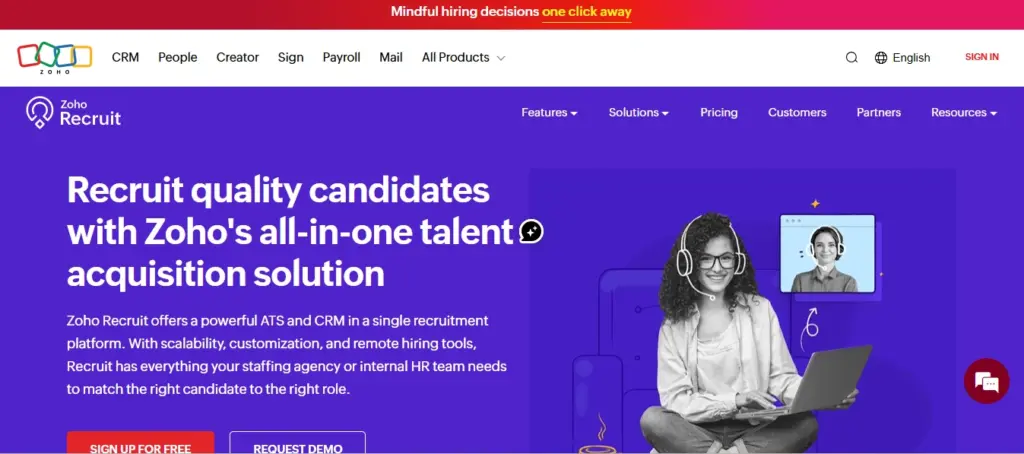
Unique Features
- Custom candidate relationship management system with notes and activity logs
- API support for third-party integrations
- Job posting on multiple platforms with one click
- Interview scheduling and resume parsing
- Automated candidate scoring
Pros and Cons
Pros | Cons |
Strong automation in recruitment CRM systems | Interface can feel cluttered |
Affordable pricing plans | Limited analytics compared to advanced tools |
Flexible customization | Customer support can be slow sometimes |
3. Workable
Workable is a global recruitment management software used by thousands of companies. It offers a complete recruitment CRM system with sourcing, candidate relationship management tools, and onboarding features.
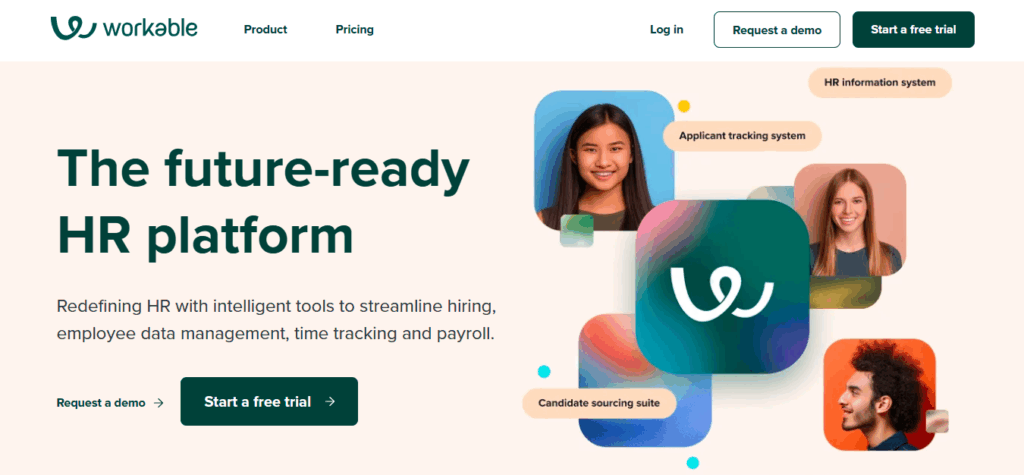
Unique Features
- One-click job posting on 200+ job boards
- AI-powered resume parsing and screening
- Built-in video interview features
- Centralized candidate tracking system
- Collaboration tools for hiring teams
Pros and Cons
Pros | Cons |
Advanced sourcing features | Pricing can be high for small companies |
Easy-to-use recruitment CRM system | Limited payroll or HR features |
Excellent collaboration and reporting | Requires internet access always |
Fact: According to a report by IMARC Group, the U.S. recruitment software market was valued at $592 million in 2024 and is projected to reach $1.358 billion by 2033, exhibiting a compound annual growth rate (CAGR) of 9.7% from 2025 to 2033.
4. Gusto
Gusto started as a payroll platform in the US but now includes recruitment management software features. It is not just a candidate tracking system but a complete HR and recruitment management system.
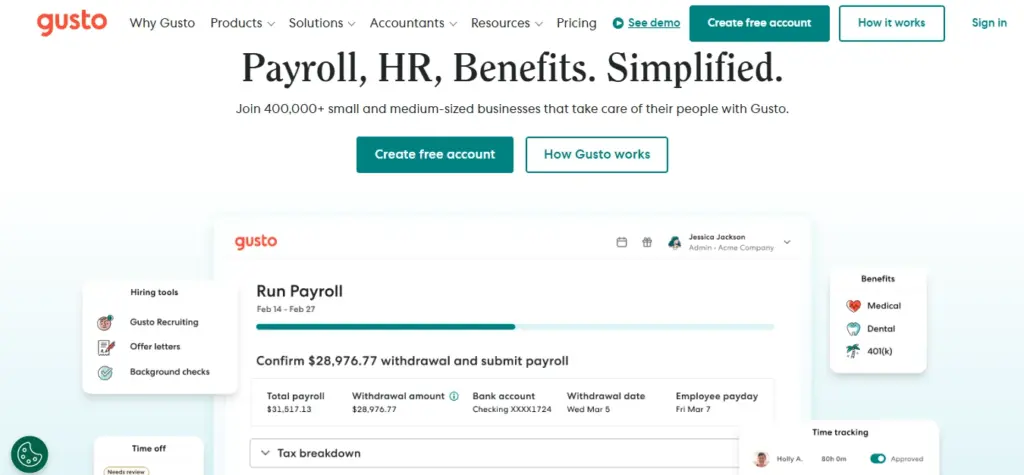
Unique Features
- Job post customization
- Applicant tracking systems built into payroll and HR
- Offer letter templates and background checks
- Onboarding checklists with compliance reminders
- Centralized document storage
Pros and Cons
Pros | Cons |
Combines payroll, HR, and recruitment CRM systems | Limited global support |
Strong compliance tools | Less suited for staffing agencies |
Good automation for small businesses | Advanced recruitment analytics missing |
5. Recruit CRM
Recruit CRM is a specialized recruitment management software built for recruitment agencies and HR professionals. It focuses heavily on candidate relationship management tools and AI-powered recruitment CRM systems.
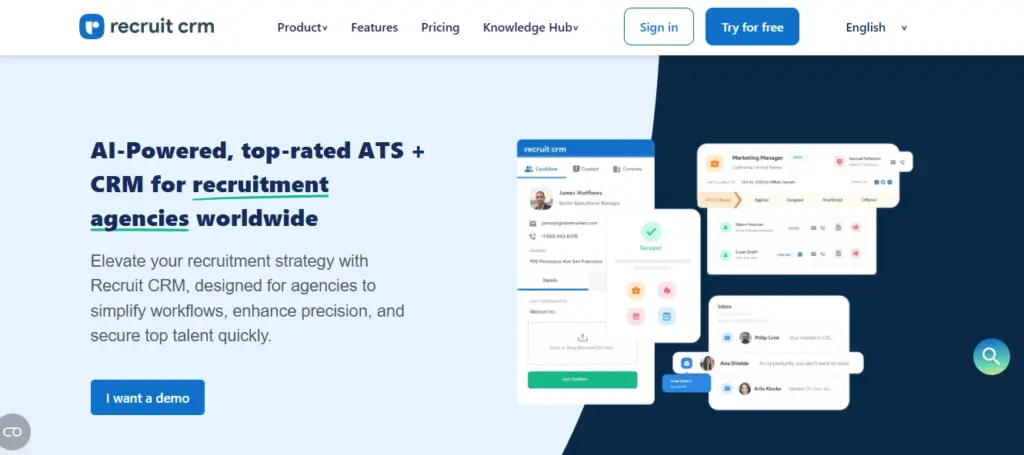
Unique Features
- AI resume parsing and matching
- Integration with ChatGPT for smart job description creation
- Automated email campaigns for candidate engagement
- Advanced reporting dashboards
- Mobile-friendly candidate tracking system
Pros and Cons
Pros | Cons |
Best suited for staffing firms | Pricing higher than basic tools |
AI features save time | Learning curve for non-technical users |
Powerful recruitment CRM system | Limited payroll or HR functions |
6. BambooHR
BambooHR is a popular HR software that includes recruitment management software features. It is designed for small and mid-sized businesses and offers a simple candidate relationship management system.
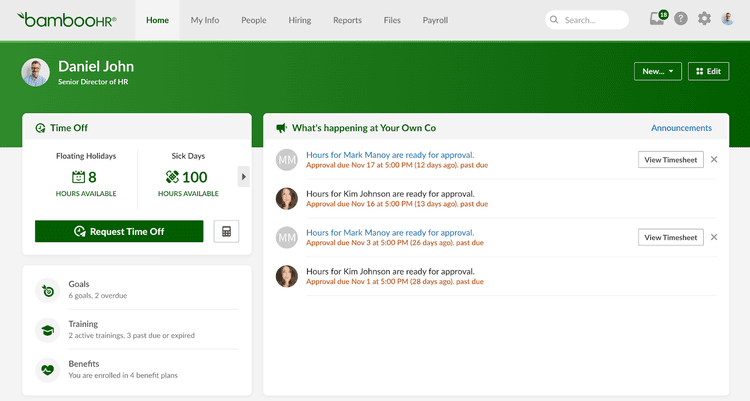
Unique Features
- Time-to-hire and attrition analytics
- Customizable workflows for recruiters
- Mobile access for hiring managers
- Smooth onboarding with electronic signatures
- Secure data storage and compliance support
Pros and Cons
Pros | Cons |
Easy-to-use recruitment management system | Limited scalability for large enterprises |
Great HR and ATS combination | Less customization in candidate tracking system |
Excellent analytics | Higher pricing for smaller companies |
7. GoHire
GoHire is a recruitment management software built for startups and small businesses. It focuses on making recruitment CRM systems simple and affordable.
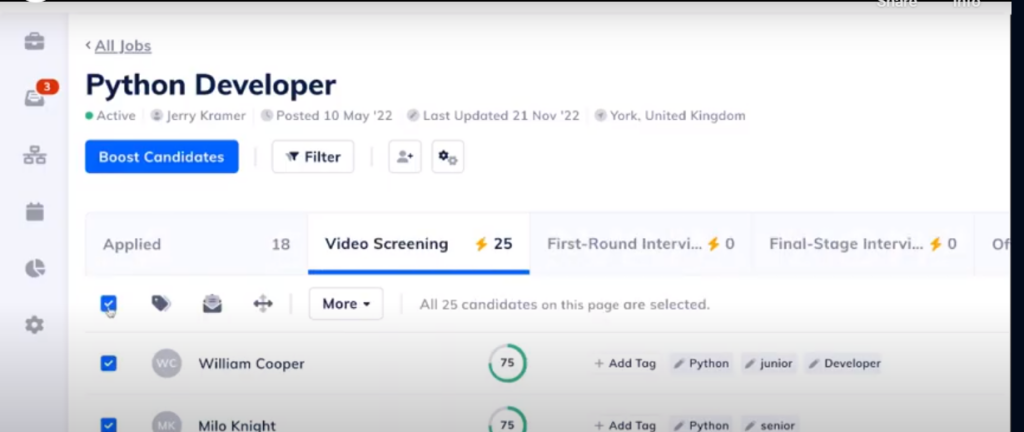
Unique Features
- Candidate tracking system with easy dashboards
- One-click job posting to job boards
- Custom offer letter generation
- Automated interview scheduling
- Strong candidate relationship management tools
Pros and Cons
Pros | Cons |
Simple and affordable | Not ideal for enterprises |
Good candidate relationship management system | Limited integrations compared to bigger players |
Easy learning curve | Reporting features are basic |
8. SmartRecruiters
SmartRecruiters is an enterprise-grade recruitment management system used by global organizations. It is a multilingual recruitment CRM system with strong analytics.
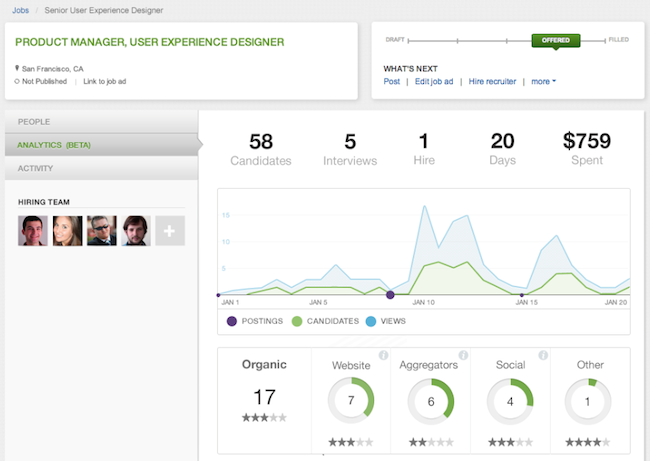
Unique Features
- ATS with 37+ languages
- AI-powered candidate matching
- Configurable workflows for complex hiring needs
- Job posting and integration with external HR tools
- Candidate relationship management tools at scale
Pros and Cons
Pros | Cons |
Ideal for global enterprises | Expensive for small businesses |
Multilingual candidate relationship management system | Setup can be complex |
Strong reporting and analytics | Requires skilled HR teams |
Fact: Data from SelectSoftwareReviews indicates that 20% of small and mid-sized businesses currently utilize an Applicant Tracking System (ATS), with 75% of recruiters using an ATS or another tech-driven recruiting tool to review applicants and enhance the overall candidate experience.
9. Rippling
Rippling is a modern all-in-one HR, IT, and recruitment management software. It combines payroll, compliance, and candidate tracking systems in one platform.
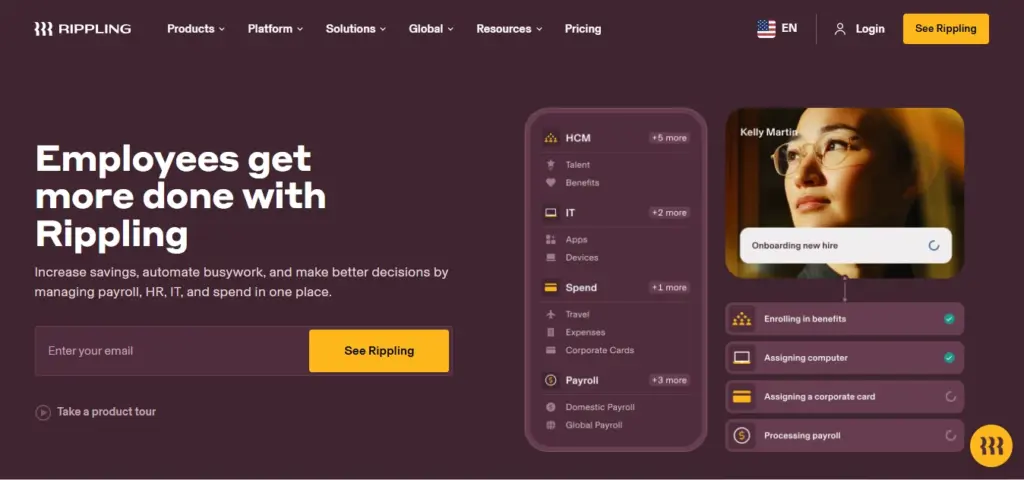
Unique Features
- Candidate onboarding in 90 seconds
- Automated job posting and screening
- Custom surveys for candidate engagement
- Compliance management tools
- Dashboards with real-time hiring analytics
Pros and Cons
Pros | Cons |
All-in-one HR and recruitment management system | Pricing is on the higher side |
Fast onboarding features | More suited for mid to large companies |
Excellent compliance tools | Less flexible for agencies |
Importance of Recruitment Management Software for Businesses
Recruitment management software is not just a “nice-to-have” anymore, it’s a must-have tool for businesses of all sizes. Here’s why it’s so important:
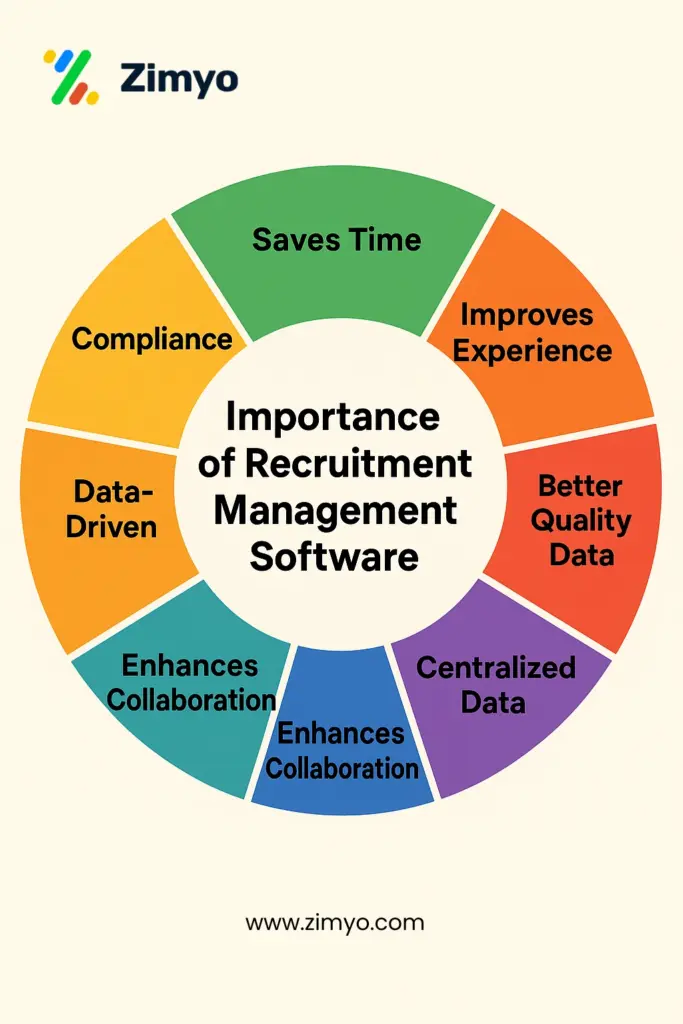
Now, let us learn about each of these in detail.
1. Saves Time and Cuts Costs
- Automates repetitive tasks like posting jobs, screening resumes, and sending emails.
- Reduces the time-to-hire and lowers recruitment expenses.
2. Improves Candidate Experience
- With applicant tracking systems and candidate relationship management tools, businesses can engage with candidates faster.
- Automated updates keep candidates informed, making the hiring process transparent and professional.
3. Better Quality of Hire
- Recruitment CRM systems use AI-driven resume parsing and candidate scoring.
- This ensures only the most relevant profiles move forward, improving hiring accuracy.
4. Centralized Candidate Data
- A recruitment management system keeps all candidate information in one place.
- HR teams can track interviews, notes, and feedback without losing data.
5. Enhances Collaboration
- Hiring managers and recruiters can work together on the same platform.
- Everyone sees real-time updates in the candidate tracking system, which reduces confusion.
6. Scalability for Growing Businesses
- As businesses grow, recruitment management software can handle bulk hiring.
- CRM for recruitment adapts to different job roles, departments, and even global hiring needs.
7. Data-Driven Decisions
- Reports on time-to-hire, cost-per-hire, and candidate conversion rates help HR leaders improve hiring strategies.
- A candidate relationship management system also gives insights into which channels bring the best talent.
8. Compliance and Security
- Recruitment management systems ensure hiring data follows labor laws and data protection policies.
- Sensitive information like resumes and background checks stay safe.
In short: Recruitment management software helps businesses hire faster, smarter, and more efficiently. It makes hiring structured, transparent, and scalable… whether you’re a startup, an agency, or an enterprise.
Conclusion
Recruitment management software is no longer optional, it is a must-have for every business that wants to attract and retain the best talent. Whether you are looking for applicant tracking systems, a recruitment CRM system, a candidate relationship management system, or an all-in-one recruitment management system, the tools listed above can transform your hiring process.
Frequently Asked Questions (FAQs)
What is the best software for recruitment?
The best software for recruitment is Zimyo, offering an all-in-one HRMS with a powerful recruitment module that automates hiring from job postings to onboarding. With AI-enabled candidate sourcing, resume parsing, customizable workflows, and seamless job board integrations, Zimyo makes hiring faster, smarter, and more efficient. Thus, making it the go-to choice for modern businesses.
Which recruitment platform is best?
When it comes to choosing the best recruitment platform, it’s Zimyo, a powerful, all-in-one HRMS that seamlessly integrates an advanced recruitment module. It offers features like AI-driven candidate sourcing, automated resume parsing, customizable workflows, smart interview scheduling, multi-job-board postings, onboarding, and analytics… all within a modern, easy-to-use interface. Hence, making it a top choice for businesses looking to align hiring efficiently and effectively.
What is the best CRM for recruitment?
When it comes to choosing the best CRM for recruitment, it’s Zimyo, an efficient all-in-one HRMS platform that seamlessly integrates CRM-driven recruitment workflows. By fusing the strengths of applicant tracking with candidate relationship management, Zimyo makes hiring smarter: offering centralized pipelines, automated job posting, resume parsing, candidate nurturing, and seamless onboarding… all wrapped in one intuitive system. It’s especially effective for businesses seeking unified HR and recruitment operations under one roof, for streamlined and scalable talent acquisition.

